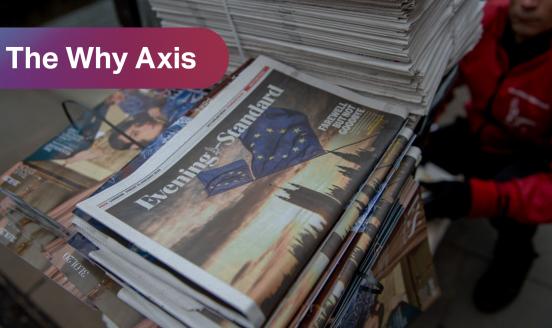Is the United States reneging on international financial standards?
The new Fed rule is a material breach of Basel III, a new development as the US had hitherto been the accord’s main champion. This action undermines t

The financial shock surrounding the COVID-19 pandemic has prompted the US Federal Reserve to temporarily loosen an important capital-to-asset ratio requirement for American banks. In so doing, the US is walking away from a decade-long commitment to global financial reform that it made in the wake of the global economic meltdown of 2008-10.
This breach, together with other recent US government actions, might signal a broader departure from the Trump administration’s general adherence in its first three years to international financial standards, an area in which it had so far not acted against the global rules-based order. The motives for the breaches are not compelling enough to offset the downsides for the global financial system and for the United States itself.
The new Fed rule breaches the Basel III Accord
On 1 April, the Federal Reserve announced a temporary change to a regulatory requirement on banks, known as the supplementary leverage ratio (or simply the leverage ratio). The leverage ratio, calculated as regulatory capital (or own funds) divided by unweighted assets, supplements the more refined ratios of capital to risk-weighted assets, which are the mainstay of bank capital regulation. While a crude measure of capital strength, the leverage ratio is an apt response to the incentives banks have to underestimate risk-weights. It acts as a simple sanity check, thus the epithet ‘supplementary.’
The new change, which the Fed adopted unanimously, exempts banks’ holdings of US sovereign debt (Treasuries) and deposits at the Fed from the assets total in the ratio calculation, until end-March 2021. This exemption reduces the denominator, making it easier for banks to meet their minimum-ratio requirements during that period. By exempting sovereign exposures, the rule deviates from the internationally agreed definition of the leverage ratio that is part of the Basel III accord, initially published in 2010 by the Basel Committee of Banking Supervision on the back of a mandate given by the G20 in 2008-09.
The Fed’s decision echoes separate congressional action in the Coronavirus Aid, Relief, and Economic Security (CARES) Act, which was signed into law on 27 March 2020. Section 4014 of CARES gives banks the option of ignoring an accounting obligation known as current expected credit loss (CECL) provisioning. Most banks started implementing this obligation in January 2020. CECL was introduced in response to a 2009 mandate from the G20, which was implemented in 2016 by the US Financial Accounting Standards Board (FASB), and separately earlier in 2014 by the International Accounting Standards Board (IASB), whose standards are applied in most jurisdictions other than the United States. By opting out of CECL, banks can avoid booking losses that are expected from the dramatic deterioration in the economic outlook from the pandemic and can thus make their capital positions look correspondingly more flattering.
The Fed’s rule change and the Congress’s action in the CARES Act suggest an incipient trend of US departures from the comprehensive package of global financial standards enacted by various bodies under the G20’s authority since 2008. One earlier signal of this came in November 2019, when the Fed and other federal bank regulators made a change – also in breach of Basel III – to an arcane rule on measuring counterparty credit risk in certain transactions.
To be sure, the United States is far from the only offender, let alone the worst. Most notoriously, in 2014, the Basel Committee found the European Union “materially non-compliant” with Basel III, the only jurisdiction in that category – partly for similar counterparty-credit-risk shenanigans as with the US rule of November 2019. Nor are the recent American breaches wholly unprecedented, if one goes far enough back. In the years before the 2008-10 financial crash, US authorities were reluctant to adopt the previous Basel II accord, for prudential reasons that the subsequent crisis experience largely vindicated. But from the first G20 summit in late 2008 up to recent months, the United States was the leading champion of G20 financial reform, and that compliant stance was maintained under the first few years of the Trump administration. Even as some financial rules were relaxed, they were kept above the minimum levels set in international accords. Indeed, the final bits of Basel III were agreed in December 2017 after Randal Quarles, a Trump appointee, replaced his Obama-era predecessor Daniel Tarullo as the Fed’s point person in Basel Committee discussions.
The motivations for these changes are unconvincing
The US departures from global standards respond to specific demands from the US banking industry and some federal agencies, but whether they are in the US national interest is questionable. The experience so far of the COVID-19 crisis is precisely that strong capital standards, such as Basel III, are helpful protections against unforeseen events. Globally-applied minimum prudential standards ensure a degree of international financial stability from which the United States benefits. Standards also prevent the most blatant competitive distortions in international banking markets – a key driver of the first Basel accord in the 1980s. It is not clear that the leverage ratio breach has benefits that offset the loss of such advantages.
The motivations for the Fed’s new rule appear to include the fact that the pandemic-induced volatility has disrupted the Treasuries market and has also resulted in a sudden influx of deposits into US banks. If banks are less constrained by the leverage ratio limit, so the thinking appears to go, they can buy more Treasuries and thus contribute to more orderly markets. But it is doubtful that leverage-ratio-related constraints played any role in the recent Treasuries market turmoil. As for the incoming deposits, banks can place them into deposits at the Federal Reserve, rather than Treasuries. A temporary exemption for such central bank deposits from the leverage ratio would not have breached Basel III in its current form. Moreover, the exemption for US sovereign exposures creates a highly problematic precedent that other jurisdictions with less creditworthy sovereign issuers might now be tempted to emulate, against the Basel Committee’s efforts to move its members towards consensus on a more rigorous recognition of the risks that such exposures might carry. Similarly, concerns about procyclical impacts of CECL could and should have been addressed by using the standard’s embedded flexibilities, similar to what was recommended outside the United States by the IASB and implemented by the euro area and the United Kingdom, among others.
By breaching G20 standards, these decisions contribute to institutional erosion at the global level and domestically. The breaches of Basel III are especially galling since Quarles now chairs the Financial Stability Board, an umbrella body whose permanent secretariat is located in the same building in Basel as the Basel Committee. On the domestic front, the Fed also acted alone, as the other federal banking regulators, including the Office of the Comptroller of the Currency and the Federal Deposit Insurance Corporation, did not endorse its new rule as is customary. The congressional override of FASB (and, in the same move, of the US Securities and Exchange Commission, which delegates to the FASB standard-setting authority), also is without precedent in nearly half a century.
The United States would lose from abandoning global financial standards
Possibly the recent breaches are one-offs, not the start of a broader trend of divergence. In a formal sense, both the Fed’s action on leverage ratio and Congress’s on accounting are temporary measures, even though they could be extended. They could, however, mirror a broader current pattern of the United States undermining the global rules-based order, from which the financial services area has been somehow ring-fenced until now. Be that as it may, these breaches are bad news for the authority of the G20, the Financial Stability Board and the Basel Committee, but are probably not crippling. Just as US agencies did not implement Basel II, and the FASB has declined to converge its standards with the IASB’s global standards, global financial standard-setting bodies can probably live with US lapses of compliance, at least for some time. It remains to be seen, however, how the implementation of the final piece of Basel III, which the Basel Committee has recently decided to delay by a year because of the COVID-19 pandemic, will be ultimately affected by an eclipse of US leadership in that area.
If the noncompliance trend is confirmed, the most damaging consequences could be to the United States itself. The chair of the foundation that hosts and oversees the FASB, in a letter that unsuccessfully attempted to persuade Congress not to pass Section 4014 of the CARES Act, argued that the action “fundamentally undermines the longstanding and time-tested approach in the U.S. to transparent, rigorous and independent accounting standard-setting, which market participants rely upon and that plays a critical role in supporting our capital markets and broader economy.”
The United States has benefited immensely from upholding best-in-class financial standards and regulations. If these standards are lowered, US economic achievements, all things equal, might be undermined as well.



